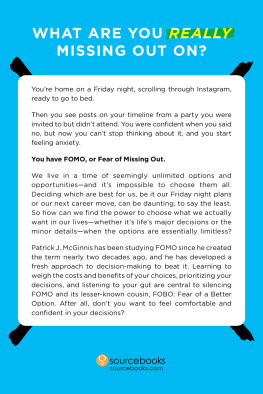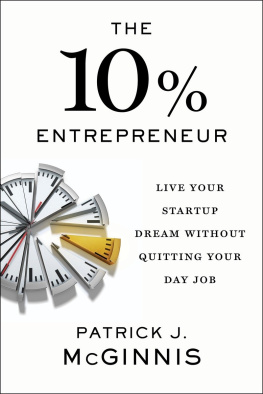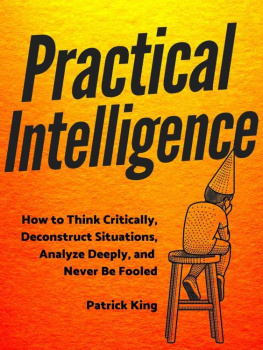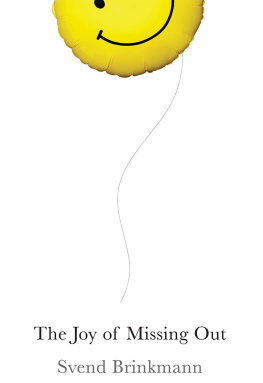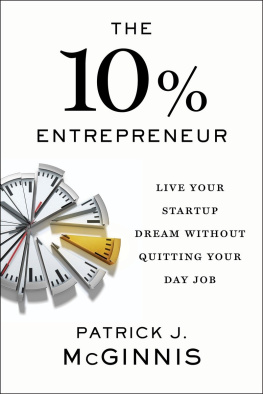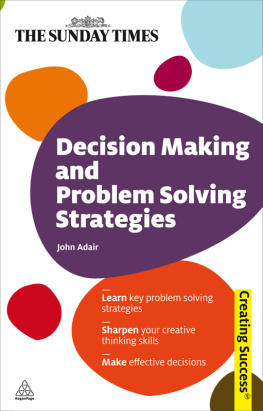Copyright 2020 by Patrick J. McGinnis
Cover and internal design 2020 by Sourcebooks
Cover design by Heather Morris/Sourcebooks
Cover images MicroOne/Shutterstock
Sourcebooks and the colophon are registered trademarks of Sourcebooks.
All rights reserved. No part of this book may be reproduced in any form or by any electronic or mechanical means including information storage and retrieval systemsexcept in the case of brief quotations embodied in critical articles or reviewswithout permission in writing from its publisher, Sourcebooks.
This publication is designed to provide accurate and authoritative information in regard to the subject matter covered. It is sold with the understanding that the publisher is not engaged in rendering legal, accounting, or other professional service. If legal advice or other expert assistance is required, the services of a competent professional person should be sought. From a Declaration of Principles Jointly Adopted by a Committee of the American Bar Association and a Committee of Publishers and Associations
All brand names and product names used in this book are trademarks, registered trademarks, or trade names of their respective holders. Sourcebooks is not associated with any product or vendor in this book.
FOMO Sapiens is a registered trademark of Patrick J. McGinnis.
Photo Credits
Internal images , TechCrunch, CC 2.0
Internal image on is available in the public domain in the United States of America.
Published by Sourcebooks
P.O. Box 4410, Naperville, Illinois 60567-4410
(630) 961-3900
sourcebooks.com
Library of Congress Cataloging-in-Publication data is on file with the publisher.
To all the FOMO sapiens, especially
those who hail from the 02163.
Contents
SECTION I
Fear and Indecision in an Overwhelming World
SECTION II
The Hidden Cost of Fear
SECTION III
Decisive: Choosing What You Actually Want and Missing Out on the Rest
SECTION IV
Making FOMO and FOBO Work for You
EPILOGUE
Were Lucky to Have Options in the First Place
Introduction
The evolution of humanity from the dawn of time to the present day is not a subject without dispute. New discoveries upend existing theory and shift the known timeline of the development of our species by a couple of hundred thousand years this way or that. Its an inexact science, one that melds paleontology with genetics. Still, experts generally agree that about two million years ago, our first ancestor, Homo habilis (named for its use of stone tools), roamed Africa. Eventually, Homo habilis gave way to Homo erectus , and later Homo sapiens , which has dominated the earth ever since.
Im here to announce a major new addition to the history of human evolution. While Im not an archaeologist, I can assure you that there was no need to dig for fossils in rural Ethiopia to make the groundbreaking discovery that Im about to share with you. There is ample evidence of this new form of human on the streets of New York, on the Tube in London, in the office buildings of Beijing, and at the coffee shops of So Paulo. Just as Homo sapiens displaced Homo erectus , modern humankind is itself giving way to a new species: FOMO sapiens .
You might be asking yourself how I can be so certain of this next stage of evolution. The short answer is that it takes one to know one.
My name is Patrick J. McGinnis, and I am the first known FOMO sapiens . I initially arrived at this realization way back in the early 2000s when I was a graduate student. But while I was the first of this new and curious species, I am certainly not the last. Today there are hundreds of millions, if not billions, of FOMO sapiens . Just as you could identify Homo habilis by its stone tools, FOMO sapiens exhibits a few tell-tale characteristics. In its natural habitat, FOMO sapiens can be observed yearning for all of the things, either real or imagined, that could make life perfect , if only it could have them or do them at this very moment. Its so distracted that if it had any natural predators, it would make for shockingly easy prey.
If you havent heard of FOMO, let me catch you up. Do you ever get stressed out when you come across those delightful (read: highly selective, filtered, and cropped) photos posted by friends, family, and celebrities to your social media feed? As you scroll, you may notice that a feeling starts to build within you, perhaps best understood as a sense of anxiety. While youre playing with your phone, it occurs to you that all of these people are living lives that are far more interesting, exciting, successful, and, frankly, Instagramable than yours. This feeling is called FOMO , short for Fear of Missing Out, and its effects are widespread.
Contrary to popular belief, FOMO isnt just confined to what you see on social media. It runs much deeper, with implications that go far beyond shaping the daily lives of digital natives, such as millennials and Gen Z. Those two groups are naturally predisposed to evolve into FOMO sapiens , but their parents are clear candidates as well. FOMO hounds the middle-aged executive who is stuck in the office while his younger colleague gets invited to a conference in Vegas. It also pesters the sixty-year-old woman whose friends share so many details about their grandkids that she longs for her children to finally start having babies already. Social media heightens FOMO, but you dont need to be glued to your phone to fall into its trap. All you have to do is spend an inordinate amount of time and energy focused on all of the things that you wish you had rather than appreciating the things that you do have yet take for granted. The temptation to do so is increasingly prevalent given that so many people now live in a world that offers overwhelming choice, either real or perceived, for almost anything.
Before I go any further, I should come clean about something: the other reason I know that I was the first FOMO sapiens is that Im the guy who came up with the term FOMO in the first place. In 2004, I introduced the acronym in an article titled Social Theory at HBS: McGinnis Two FOs in The Harbus , the student newspaper of Harvard Business School (HBS). Now, over fifteen years later, that four-letter word has become a pretty big deal. Its appeared all over pop culture and its even been added to a host of authoritative dictionaries, including the Oxford English Dictionary and Merriam-Webster. In my own life, the most tangible result of this distinction is that a lot of people want to take selfies with me. Naturally, they post them to social media in order to give all of their friends FOMOif you think about it for too long, its all pretty meta.
All selfies aside, I feel a little bit guilty for making FOMO a thing . Despite its popularity and extreme hashtagability, it is not a laughing matter. It causes stress, insecurity, jealousy, and even depression. It also imperils your success at work, tempts you to make speculative investments, and compels business leaders, from CEOs to start-up founders, to chase after the wrong strategies and squander precious resources. Put simply, its a massive distraction and a waste of valuable time and energy.
And thats not the worst of it. I regret to inform you that FOMO isnt the only FO that you have to worry about. If you were paying close attention, you might have noticed that the article I wrote was subtitled McGinnis Two FOs. So, what happened to the other FO? While FOMO has gone on to fame and fortune, the other FO, well, at least until very recently, not so much.

